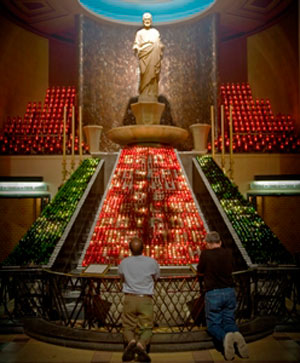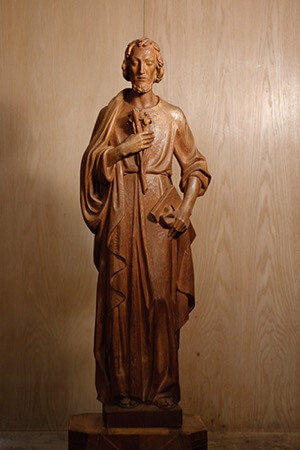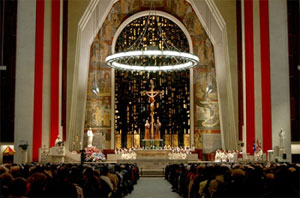
My dear Brothers and Sisters in Christ, we are in the season of Lent. It is when we sit in ashes and refuse to do business the normal way. As we mark the solemn feast of St. Joseph, permit me to single out and propose to you one of the profound virtues of St. Joseph. I believe it would be capable of inspiring us to take closer view of ourselves, our religious life or our marriage vocation, and to call us to a deeper reflection about ourselves, about God, and about our mission in the Church.
This virtue of St. Joseph sometimes appears insignificant and is so often less emphasized and forgotten. Yes, it remains profound and equally fitting for us today, and especially this season of Lent. This is the virtue of Silence.
Let me take your mind back to your school days, as I remember mine. In my English-language class, students were not allowed to speak any local language apart from English. If you spoke vernacular, if you were simply talkative or chatty, you wore a placard around your neck. There were different statements on those placards. One of them had the message: “Help, help, I can’t stop talking … help ...”
We know today that the easiest part of our prayer is to speak to God. To silence ourselves, to zip it, to listen, is the most difficult part of prayer for a lot of us. We are told by St. Cyprian: “When we pray, we speak to God; when we silence ourselves in order to listen, God speaks to us.”

The Danish philosopher Soren Kierkegaard once wrote: “The present state of the world and the whole of life is diseased. If I were a doctor and I were asked for my advice, I should reply: ‘Create silence! Bring people to silence!’ The Word of God cannot be heard in the noisy world of today. And even if it were trumpeted forth with all the panoply of noise so that it could be heard in the midst of all the other noise, then it would no longer be the Word of God. Therefore, create silence!”
There is a simple truth at stake. There can be no real relationship with God; there can be no real meeting with God, without silence. Silence prepares for that meeting, and silence follows it. We are witnesses to the noisy nature of our world today, which is a threat to our relationship with God. We live in a noisy world. And worst of all there is noise in our minds and hearts. However, silence is sine qua non (indispensable) in our quest to enter into relationship with God, to hear his voice and to discern his will for us and in our lives (Perfectae Caritatis, no.1).
Read more reflections by Holy Cross religious
If we cannot meet with God in silence, how can we, as religious men and women, called to an intimate relationship with God, achieve our vocation of intimacy in a world full of noise? It is against this background that I wish to reflect with you on the relevance of the “Silent Joseph” in our world today.
Let us ask ourselves this seemingly unimportant, yet very significant question in our quest to identify and appreciate what we can learn from the life of St Joseph. Who is St. Joseph?

Joseph first appears in the infancy narratives of the Gospels of Matthew and Luke. Luke identifies him to be of the house and lineage of David (2:4). For Matthew, Joseph was an “upright man” (1:19); that is to say, he lived by God’s standards and kept the commandments of God faithfully. He is said to be the husband of Mary, the mother of our Lord Jesus Christ, and hence, his foster father.
The gospels give us the accounts of how Mary came to be betrothed to Joseph, and traditionally became his wife, even though he was not living with her. Before they could come together, Joseph, we are told, found out Mary had conceived, and so decided to divorce her quietly (Mt 1:19). According to the Tora, Joseph could have had Mary stoned to death for infidelity (cf Deut. 22). Nevertheless, we are told the Angel of the Lord appeared to him in a dream, and revealed to him that Mary had conceived by the power of the Holy Spirit, and urged him to take Mary as his wife. Without question or hesitation, Joseph did as the Angel had said.
After the birth of Jesus, Herod sought to kill the Child Jesus, and Joseph was alerted in a dream. Right away, Joseph took Mary and the child in the night, to a safer place in Egypt (Mt 2:13-15). After the death of Herod, he was again alerted in a dream to take the family back to Israel, and was given more instruction in a dream, and he settled at Nazareth (Mt 2:19-23). As a father to Jesus, he sought to fulfill all the traditions concerning Mary and the Child Jesus, as regards presentation of the Child in the Temple and the purification (Lk 2:22ff).
From the above, one can deduce that Joseph fulfilled his obligations courageously as husband and as father; and throughout the gospel, he faithfully and unquestionably obeyed the commands and directions of God. He was a man of great faith who did whatever God asked of him even when he did not know the outcome. He expressed his faith by action. He accepted the responsibilities of his vocation, and as a husband and a father, he invested himself in the spiritual and the moral formation of his son in particular, and his family in general.

Despite playing all these critical and significant roles in the life of the Holy Family, Joseph is silent in the scripture. The gospels do not record even a single word or a spoken verse for him, yet his influence, significance, and relevance cannot be underestimated. That is the power of silence.
As religious men and women and as Christians called to intimacy with the Lord in a world of noise, what lessons can we learn from the silent Joseph? We know that to hear and to decode or to decrypt the voice of God in a noisy environment can be very difficult; it is only in silence that we hear the voice of the Lord, speaking to us and directing us on what to do, how to do it, and where to go.
It was in the silence of sleep that St. Joseph came to know the will of God and to carry out his special mission as the foster father of God’s own Son for which he was chosen. The silent life of Joseph challenges us as Christians to create time for silence, because, it is in silence that the Lord reveals to us his will and his purpose in our lives.
Meet the three patrons of the Holy Cross family
St. Joseph teaches us that, silence does not mean a person is unconcerned or uninterested; it is rather a tool for concentration. Pope Emeritus Benedict XVI in speaking about Joseph, said, “His is a silence permeated by contemplation of the mystery of God, in an attitude of total availability to His divine wishes. In other words, the silence of St Joseph was not the sign of an inner void, but on the contrary, of the fullness of faith he carried in his heart, and which guided each and every one of his thoughts and actions.”
The silence of Joseph, therefore, is an invitation to be better about removing distractions and idle chatter to make provision for more room and space for contemplating where it is that God may be calling us to.
We can understand the value and relevance of Joseph in today’s world by appreciating his silent contribution to the mystery of the Incarnation, by his dedication to the vocation he was called to. In a society all too often filled with noise, we can learn much from the silent Joseph by finding time for silence and making ourselves more available to God and to the vocation to which He has called us, regardless of any distractions.

In silence, Joseph was a man for others. Though the Scriptures say so little about Joseph, his silence speaks volumes on his selflessness and readiness to take up any task for the benefit of the other. Why? He always put the interests of others before his own. He loved Mary above himself and his behavior was just a result of his love. He was prepared to do anything to save the life of the child Jesus. How refreshing this upright man, yet humble in all respects, would brave difficulties just for the sake of others?
In an age where people often shy away when difficulties arise, especially if that undertaking would not yield direct benefits to oneself, does the life of Joseph not an invitation to us as Christians, and as religious men and women, to go on quietly yet effectively to execute our responsibilities, as demanded by our vocations, for the betterment of humanity and for the greater glory of God, without trumpeting them?
Let us join our silence to the Silence of Joseph. It is only in silence that we can listen to the Lord’s instructions to do the extra work no one is doing. May St. Joseph continue to intercede for us!
This reflection for the Feast of St. Joseph, the Patron of the Holy Cross Brothers, was written by Br. John Badu Affum, C.S.C. After years serving as Novice Master, Br. Affum was elected in 2018 as the Superior of the District of West Africa (Cape Coast, Ghana).